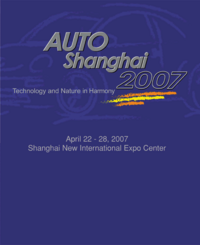Debate in Shanghai: Hybrid or Fuel Cell
SEE ALSO:Hybrid Buyers Guide
SEE ALSO: Shanghai Auto Show
Special to The Auto Channel
By Bradley Berman
Editor, HybridCars.com
Shanghai April 21, 2007: Source - New York Times The car market in China is expanding at a dizzying rate. Will the country pins its hopes on unproven technologies, or begin working with proven solutions?
In a global drama to reduce the environmental impact from cars and trucks, China is taking center stage. China’s vehicle market is already the second largest in the world, after the United States, and rapidly expanding. By 2030, the total number of personal cars in China is expected to exceed the United States—which means the total number of cars on roads worldwide will approach two billion.
The cars on display at the current Shanghai auto show indicates that China is serious about alternatives to the internal combustion engine—but also reveals that it has not sorted out the differences between real short-term solutions and long-term dreams. In their coverage of the Shanghai show, the New York Times reported that the Chinese government has not chosen among options like electric battery cars, fuel cells, hybrids and ethanol combustion, but wants the industry to move quickly to find the best approach and adopt it.
Western environmentalists have long speculated whether China may actually leapfrog the West in personal transportation by embracing new automotive technologies before the country’s oil and auto industries can become too wedded to internal combustion engines.
The odds of such a leapfrogging have eroded because nobody has yet surmounted the technological obstacles that prevent a broad switch from gasoline technology to hydrogen fuel cells, said An Feng, the executive director of the Innovation Center for Energy and Transportation in Beijing.
Japanese companies, particularly Toyota and Honda, are already far ahead in the hybrid gasoline-electric designs that have proved more attractive lately to Chinese companies than fuel cells, said Kelly Sims Gallagher, the director of the Energy Technology Innovation Project at Harvard.
The key question is how much environmental damage will occur before China realizes that hybrids and other conventional fuel-saving technologies are ready today—while it throws investment dollars and engineering resources at hydrogen fuel cells.



